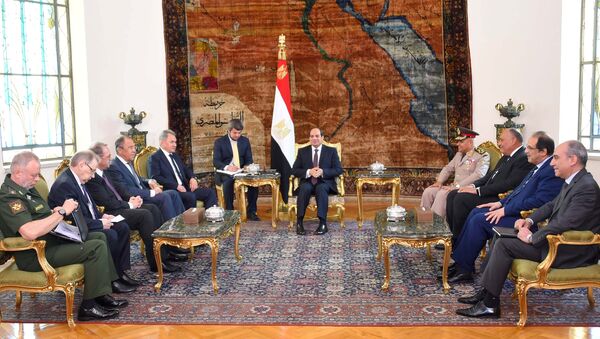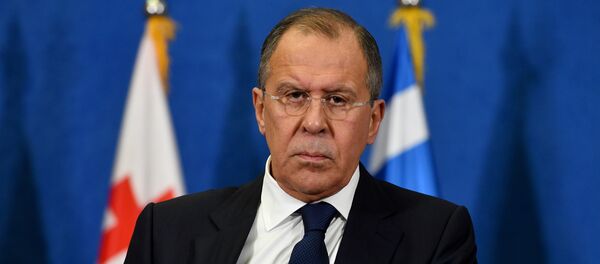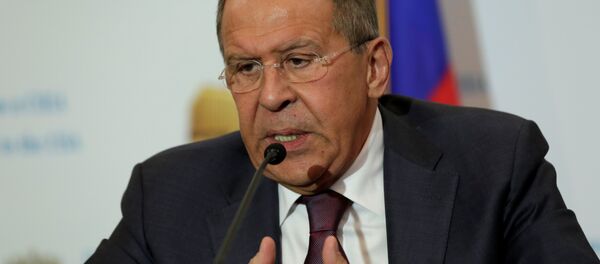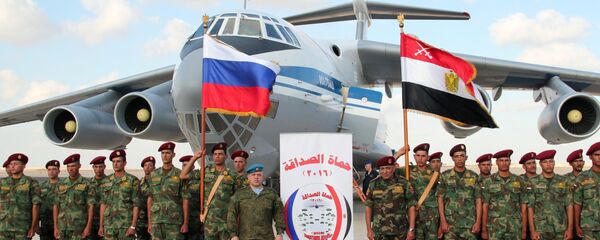Political scientist Gevorg Mirzayan, Associate Professor at the Department of Political Sciences of Finance University under the Government of the Russian Federation, commented on the visit and reviewed what thorny issues are still left in the relationship between the two countries.
Why the tables have turned
"Such a warm welcome can be explained very simply: over the last years, Russian-Egyptian relations have been experiencing a renaissance as Cairo, which left Moscow for Washington in the 1970s, is now returning to its "home harbor," Mirzayan ironically writes in his article for Sputnik.
"Egypt has become very disappointed with its new wife – she is very beautiful and rich, however she’s turned out to be very capricious," Mirzayan describes Cairo's relations with Washington.
He further elaborated that Egypt won't forget how the Americans threatened to freeze all arms shipments to the Egyptians if they didn’t return the ousted Islamist President Abdel Fattah el-Sisi to power. Mirzayan continued by saying that Trump looks far more competent than Obama and won't be distracted by such trifles as human rights, the inhumane attitude towards Islamists and the clamp-down on NGOs (on Monday, el-Sisi signed into law a bill which restricts NGO activity to developmental and social work and introduces jail terms for non-compliance).
"This is exactly why Egypt started looking for a new partner, predictable, pragmatic and reliable, and found it in Russia. This partially explains why the agenda of the talks was so broad. Apart from bilateral cooperation, it touched upon nearly all Middle Eastern issues. According to the Russian Foreign Ministry, it included the joint fight against terrorism, the settlement of the Syrian crisis, the Arab-Israeli settlement, the situation in Libya, Yemen, Iraq and the prospect of creating a zone in the Middle East free from weapons of mass destruction," Mirzayan says.
However it does not mean that the sides readily found a common language: the two countries are too different, as are their interests and the understanding of sovereignty. Hence, the political analyst says, there were problems with the three issues on the agenda, namely the overall fight against terrorism, the fight against terrorism in Libya and the fight over Russian tourists.
Fight against terrorism: Pick your sides
"They are greatly dependent on the major sponsor of terrorism, Saudi Arabia. Riyadh and its Gulf allies are major investors into, and creditors of, the Egyptian economy. Egypt is re-arming its army using Saudi money, including Russian arms purchases," he explained.
This is why Egypt, according to some former high officials, does not want conflict with the Saudis. Cairo has a certain carte blanche to fight against terrorism on the Sinai peninsula and a certain room to maneuver, for example, not to send its army to fight for the Saudi interests in Yemen. However Cairo won't risk fighting against Saudi-backed groups in Syria. That is why Russia should not count on its support, the political analyst explained.
Don't bomb there, bomb here
However the Egyptians are ready to cooperate with Moscow in the fight against terrorism, Mirzayan says. Not in Syria, but in another country, "permitted" by Riyadh. Egypt wants to pull Russia into the operations in Libya.
This cooperation could then boost a rapprochement between Russia and Europe.
Are these potential benefits worth the risks which Russia will be forced to undertake, the political analyst further wonders. Libya is a tribal country and any attempt to find peace there through a political compromise is doomed to fail.
The only chance is to act as Gaddafi, he suggests, eliminating and threatening whomever you can, and buying and then threatening the rest.
Besides, Moscow has been actively participating in the Syrian operation and has been spending its resources on stabilizing the situation in Ukraine.
Hence if Egypt and its western backers do not offer a fair price, the Kremlin will refuse to get involved in the Libyan campaign, Mirzayan says.
Between money and pride
"In this context, it is of fundamental importance to complete the investigation, as well as to implement the practical steps that have been agreed upon between our parties, and the full implementation of which will allow us to proceed with the practical resumption of flights," Lavrov said on Monday.
The minister stressed that "the Russian side does not put forward any new conditions."
Mirzayan added that Moscow's key demand is that Russian security experts should be present in Egyptian airports. Cairo however regards this as a breach of its sovereignty.
"Egypt can be understood clearly, the country is trying to regains the role of a leader in the Arab world and can't afford such a demonstrative humiliation and distrust in its ability to control security in its airports," the political scientist says.
However Moscow’s views are also clear, it can't afford another terrorist attack against its citizens in the Middle East. The Kremlin is not ready to sacrifice Russian interests for the sake of Egypt's loyalty, he concluded.







